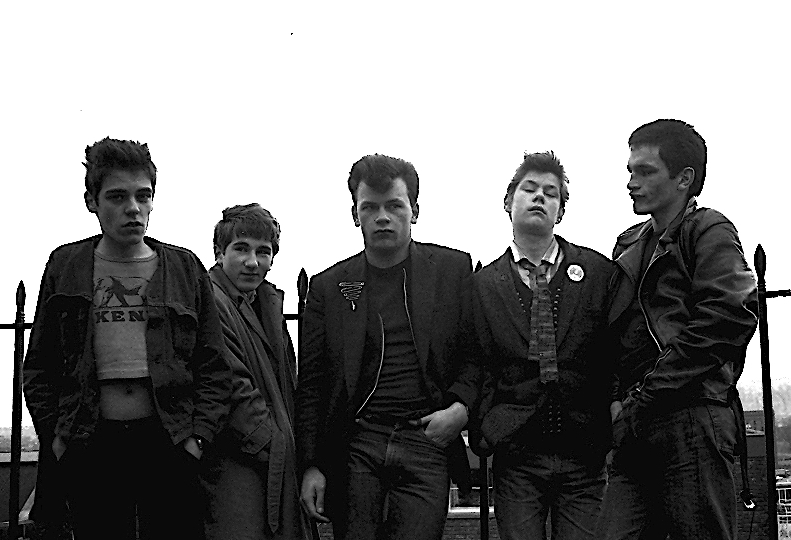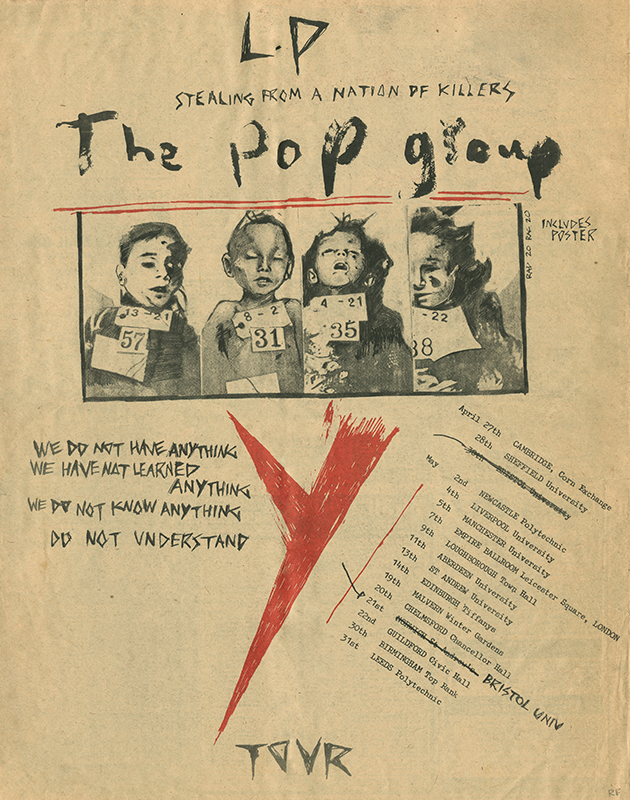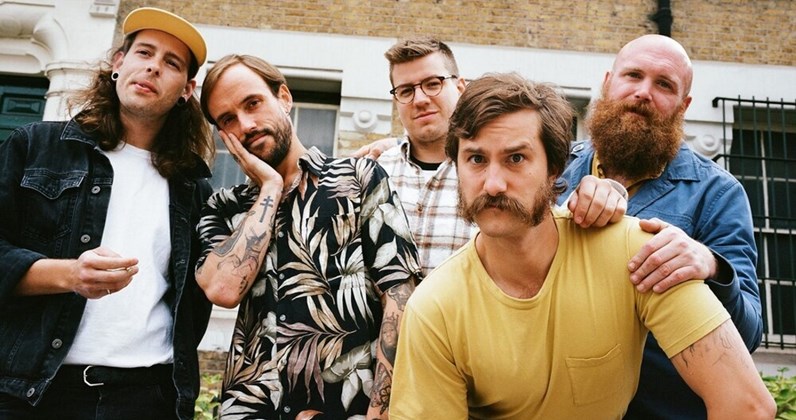History of Bristol Punk: ‘76 to today in four bands
 By Resonate | April 14, 2022
By Resonate | April 14, 2022
Words by Finch Evans
Bristol has a reputation for being a hotbed of counter culture and rebellion, making it the perfect setting for rising punk bands. However, in popular culture, the musical history of Bristol has been defined not by guitars and safety pins, but a more eclectic and electronic mix of dub, dance music, dubstep and trip-hop.
That’s not to say Bristol hasn’t had its fair share of anarchic buzzsaw guitars. As these four bands show, our city on the Avon has more than made its mark on the subculture of British punk music.
The Cortinas (1976-78)
It would be a stretch to say Bristol exploded onto the British punk scene. When this group of five teenagers known as The Cortinas decided to ditch the R’n’B covers and unveil a set of New York Dolls-inspired punk songs, they became what many consider to be the first Bristol punk band. However, the UK music press didn’t quite know what to think of them. They were too loud and chaotic to be rock and roll, too well-dressed to be punk, and too young to really be taken seriously. As a result, the Cortinas live show often had a Marmite-esque reception. They were particularly adored by some young writers, who could perhaps see some of themselves in the schoolboy quintet – but more established punks were less impressed, seeing them as at best a band with potential. This stubborn refusal of the press to take the Bristol boys seriously can be perfectly summed up in John Hambletts review of their first and only full length album, True Romance:
“I remember watching the Cortinas some time ago in the common room at Leeds Poly, I think. I didn’t like them very much then, but thought they’d probably improve, and they have. I still don’t like them very much, but they’ve definitely improved.”
Despite this lukewarm reception from the press, The Cortinas still stormed through the checklist of the 70s punk experience, appearing on bills with punk heads-of-state Blondie and The Stranglers and headlining such institutions as the Roxy and the Marquee. They even recorded a session with John Peel at Maida Vale.
As befitting a first wave punk band, The Cortinas lasted a mere two years before breaking up. They didn’t even make it to the release of a debut album. Although they hadn’t taken the punk world by storm, they proved that punk had a place in Bristol. History has been kinder to the punk pioneers in hindsight, with guitarist Nick Sheppard going on to join a late incarnation of The Clash, and even overdue vindication from the press. In 2001, Mojo printed a list of 100 punk scorchers and there at #64, between John Cooper Clark and the Buzzcocks, lies their single Fascist Dictator.

The Pop Group (1977-81)
As the first wave of punk burnt itself out towards the later years of the 70s, bands began to look towards influences beyond British pub rock and New York CBGB’s punk. The ethos of ‘three chords and the truth’ had run its course, mohawks and spiked jackets were suddenly passé and punk as we understood it then had died, not for the last time. Against this backdrop and in good company with John Lydon and PiL, Bristol upstarts The Pop Group added influences from dub, jazz and avant garde to a raw and noisy punk foundation, becoming one of the early pioneers of post-punk.
Frontman Mark Stewart was close friends with Jeremy Valentine of The Cortinas, and together with groups of friends, they would often take trips to London to the Roxy to see punk bands. It was on one of these trips that the Pop Group was formed. Their Blockheads-esque avant-racket and utter disdain for the accepted connection between band and audience made them somewhat of a ‘band’s band’. You wouldn’t play We Are All Prostitutes at a house party, or dance to She Is Beyond Good and Evil to try and flirt in a nightclub, however, the pioneering Pop Group have found themselves in many a list of biggest influences for countless bands over the decades since, proving their essential influence on culture as we understand it.

Disorder (1980s)
While post-punk acts like The Pop Group were making punk slower and more expansive, another mutation of the punk explosion was doing the opposite. Certain punk groups began to compete to be louder, faster and more typically ‘punk’. Through this feedback loop, hardcore punk was born.
This new subgenre mostly took hold in the US, with acts like Black Flag, Minor Threat and Bad Brains finding hero status with their exhilarating breakneck drums, buzzsaw guitars and screeching, politically-charged lyrics. However, this movement wasn’t limited to the land of Reagan and rifles, with plenty of homegrown hardcore bands such as Discharge, GBH and the Bristol-born Disorder popping up all over the UK.
Whether you want to call them street punk, D-beat or simply hardcore, Disorder drilled into your skull with a rush of high-octane punk mixed with snarled, jocular lyrics, and like any good punk group, you could fill a football team with their past members, many of which with appropriately punk nicknames like ‘Boobs’, ‘Goz’ and ‘Virus.’ Disorder were (and indeed still are) DIY through and through, refusing to sign to a record label, and remaining active in the hardcore scene.
IDLES (2009 – Present)
Despite a relatively slow start to their music career, IDLES blasted on to the international scene with the release of their debut album, Brutalism, in 2016. Seven years into their career, the quintet spearheaded a modern revival of the post-punk scene along with acts like Shame, Fontaines D.C. and fellow Bristol noise merchants Heavy Lungs. Arguably the group closest to what could be considered mainstream rock, IDLES have enjoyed primetime radio play, had their music featured in TV shows like Brassic and Peaky Blinders, and have had high-profile slots at some of the biggest festivals both sides of the Atlantic.
Despite their massive success, IDLES are not free of controversy. Like The Cortinas, critics seem to be falling over themselves to heap praise on IDLES, while fans and fellow musicians have a more rocky relationship with the band. The biggest criticism has come from Sleaford Mods frontman,Jason Williamson, who has leveled accusations of class appropriation at the band, who boast within their ranks a dentist, a pub-owner and not one but two college lecturers:
“And they were nice lads, polite online and stuff. But I thought they were kind of a street band, there were lines like ‘Tarquin’ that would insinuate that they were knocking the middle classes, but it turns out they’re not working class.”
Following this, Fat White Family frontman Lias Saoudi weighed in, stating in a Facebook post:
“The last thing our increasingly puritanical culture needs right now is a bunch of self-neutering middle-class boobs telling us to be nice to immigrants; you might call that art, I call it sententious pedantry”.
Whatever you think about their politics, IDLES are fucking everywhere. Since their 2016 debut, they’ve been through three massive album releases and appeared on every big festival lineup going. It’s understandable that fans can start to feel a bit drained.

2022 – The Future
These four are by no means the only contributions the City of Bristol has made to punk, and the city is still brimming with angry kids with guitars. The next band to be added to the list of influential Bristol Bands is probably playing a gig this weekend – so if any of this sounds interesting to you, douse your hair in egg whites and sugar, safety pin together your most battered pair of jeans, and go pogo and spit to your heart’s content.
For more industry insights click, here